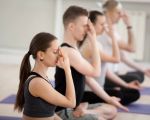- 1-Understanding-The-Importance-Of-Healthy-Aging
- 2-Physical-Benefits-Of-Yoga-For-Aging
- 3-Mental-And-Emotional-Benefits-Of-Yoga
- 4-How-Yoga-Supports-Balance-And-Mobility
- 5-Stress-Reduction-And-Cognitive-Health-Through-Yoga
- 6-Real-Life-Stories-Of-Aging-Well-With-Yoga
- 7-Resources-From-Free-Yoga-Links-For-Healthy-Aging
Understanding The Importance Of Healthy Aging
Healthy aging is a goal many strive for, encompassing physical vitality, mental sharpness, and emotional well-being as we grow older. With the global population aging rapidly, adopting practices that promote longevity and quality of life is essential. Yoga has emerged as a powerful, accessible tool to support healthy aging, helping individuals maintain independence and improve overall wellness.
Unlike high-impact exercises, yoga is gentle on joints and adaptable to all fitness levels, making it ideal for older adults. By integrating breathing, movement, and mindfulness, yoga addresses multiple aspects of health simultaneously, setting the foundation for a vibrant aging process.
Physical Benefits Of Yoga For Aging
Yoga enhances strength, flexibility, and cardiovascular health—three pillars critical for healthy aging. Regular practice helps maintain muscle tone and joint health, reducing the risk of falls and injuries. Improved circulation from yoga postures supports heart health and promotes better digestion.
Specific poses focus on opening tight areas commonly affected by age, such as hips and shoulders, relieving stiffness and pain. The low-impact nature of yoga allows gradual progression, which is essential for safely building endurance and mobility in older adults.
Mental And Emotional Benefits Of Yoga
Beyond physical advantages, yoga profoundly supports mental clarity and emotional resilience. Practicing mindfulness and controlled breathing cultivates calmness and reduces symptoms of anxiety and depression, conditions that frequently affect the elderly.
Yoga encourages self-awareness and acceptance, helping practitioners navigate the emotional complexities of aging with grace. Meditation components enhance focus and memory, contributing to cognitive health that supports independence.
How Yoga Supports Balance And Mobility
One of the most critical benefits of yoga for healthy aging is its positive impact on balance and mobility. Many yoga poses challenge and strengthen the core and lower body, vital for preventing falls—a leading cause of injury among seniors.
Through consistent practice, individuals develop better posture, proprioception, and coordination. The gentle stretches and movements also increase joint lubrication and range of motion, helping maintain functional independence in daily activities.
Stress Reduction And Cognitive Health Through Yoga
Chronic stress accelerates aging and negatively affects cognitive function. Yoga’s focus on breath control and relaxation activates the parasympathetic nervous system, reducing cortisol levels and promoting a sense of well-being.
Scientific studies link regular yoga practice with improvements in brain structure and function, including areas related to memory and executive function. These findings suggest yoga as a non-pharmaceutical strategy to combat age-related cognitive decline.
Real-Life Stories Of Aging Well With Yoga
Numerous older adults credit yoga for transforming their health and vitality. For instance, a 70-year-old practitioner reported reduced arthritis pain and greater energy after a year of gentle yoga classes. Another shared how yoga meditation helped alleviate anxiety related to aging transitions.
These stories highlight yoga’s adaptability and effectiveness, inspiring others to begin their own healthy aging journeys through mindful movement and breath.
Resources From Free Yoga Links For Healthy Aging
For those interested in incorporating yoga into their healthy aging routine, Free Yoga Links offers a comprehensive selection of guided practices tailored to older adults. From beginner-friendly flows to meditation sessions, their resources make yoga accessible and enjoyable.
Additionally, Free Yoga Links provides community support and expert advice, ensuring users have the tools and motivation to maintain consistent practice and reap the full benefits of yoga for healthy aging.








